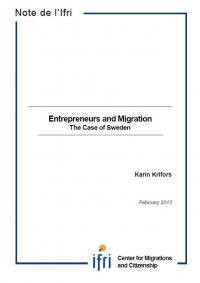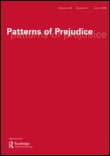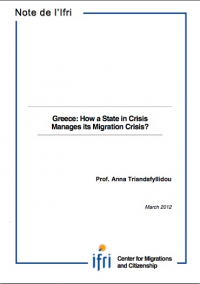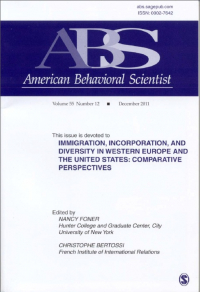The " Swedish Model " of labor immigration management came to a turning point with the 2008 reform. This major reform consisted in a deregulation of the labor market, which until then had only opened a limited number of positions to migrants. However, what consequences can be expected from...

Migration and Citizenship
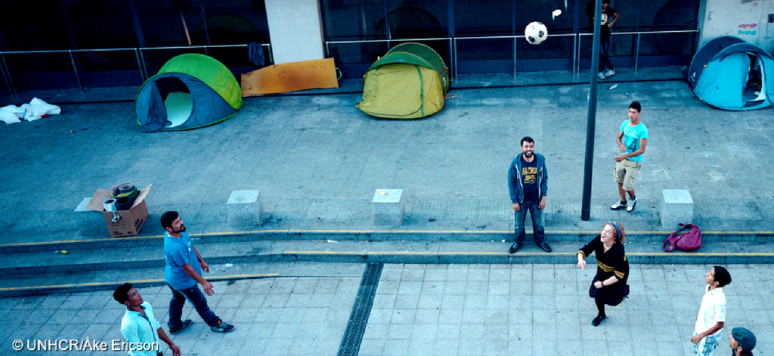
International migrations have become the focus of current public debates and policies in various regions of the world, including Europe.
With the creation of the Migration Program in 2005 and then the Center for Migration and Citizenship in 2011, the French institute of international relations - Ifri was the first research institute to analyze migration and new practices of citizenship as a matter of international relations. In order to respond to a complex and polarizing issue, the Center for Migration and Citizenship aims at better shaping the debate and research with an independent and non-polemical approach. The Center’s work is directed to all kind of stakeholders active in the field of migration at the local, national, European and international levels: decision and law makers, authorities, not-for-profit organizations and the private sector.
The Center for Migration and Citizenship offers a unique perspective on migration and citizenship issues in France through:
- Activities at the crossroad of academic research, support to decision making and capacity building of actors in the field;
- An analysis of the gaps and tensions between public policies and needs in the field;
- A multidisciplinary research blending sociological, political and legal approaches;
- An original methodology that involves, in a proactive and dynamic way, the main stakeholders and social actors concerned by the topic: public institutions, policymakers, NGOs, private companies, migrants, and the inhabitants of the less favored neighborhoods throughout Europe. These groups constitute at the same time the target and the contributors to the center’s projects.
The Arab Gulf is the third largest receiving region for global migrants (after North America and the European Union). The six states of the Gulf Corporation Council (GCC) are the richest Arab economies, boast some of the highest GDP per capita rankings in the world, and they all depend upon...
The articles collected in this special issue set out to assess critically both aspects (making and representing the world) of national models from a comparative perspective, bringing together analysis of immigration countries in Europe (in the Netherlands, France and Britain) and settler...
More often than not, the notion of a national model of immigrant integration is held to be self-evident in the comparative scholarship. This type of reasoning, however, does not go without serious costs for the social sciences. Among these costs are the danger of reifying the categories used...
By the end of 2004, low migration flow regulation contributed to a high rate of irregularity and hampered adaptation of foreign labor supplies to the demands of the Spanish labor market, contributing therewith to an increase in irregular workers. The remarkable change came with the change of...
In the past 2 years, Greece has experienced its most severe economic crisis of the post-World War II period. While it appeared at first not to have been hit particularly hard by the global economic recession that started in 2008, the effects of the recession and the acute internal crisis of...
On Friday, the 13th of January, 2012, the Center for Migrations and Citizenship welcomed 3-star U.S. Army General Bostick as a speaker of its international conference: "Business and the State: Migration Policies, Diversity and Integration".
On Friday, the 13th of January, 2012, the Center for Migrations and Citizenship welcomed Jesus 'Chuy' Garcia - Cook County Commissioner, Chicago (USA) - as a speaker of its international conference "Business and the State: Migration Policies, Diversity and Integration".
While public opinion and European governments usually present migrants as an outside threat for European societies, in this article, Danièle Joly and Khursheed Wadia focus on the local level to analyze the issue of migrants, in particular irregular workers, living in the UK.
What is the French model of integration?
Christophe Bertossi's presentation, Understanding the crisis of national models of integration, Résidence de l'Ambassadeur du Royaume des Pays-Bas in Paris.
Beyond Models of Integration: France, the Netherlands and the Crisis of their National Models
Second closed seminar of the project, organised by Ifri and ASSR (Amsterdam School for Social Science Research) at Ifri with Christophe Bertossi (Ifri), Jan Willem Duyvendak (ASSR, Amsterdam), Peter Scholten (Université de Twente), N
The three problems of French citizenship
Christophe Bertossi's presentation, Annual conference of the Gulbenkian Migration Forum, Lisbon.
Towards an Empirical Sociology of the French Republican Model
Intervention de Christophe Bertossi, Models of Difference and Belonging: Refiguring the Social Study of Europe, University de Washington à St-Louis, Social Sciences Research Council, St-Louis, USA.
Key-note address' on the French politics of citizenship
Intervention de Christophe Bertossi pour la conclusion de la 31ème conférence annuelle de l'International Political Psychology Association, Paris.
The Transfert of Migrants : Which Links between the Migratory policies ans the Development of the Countries of Migration
Breakfast Meeting with Jean-Pierre Garson, chef de la Division des économies non membres et des migrations internationales, OCDE, and Guillaume Almeras, associé-gérant de BGV Consulting, membre de l'Institut de Prospective et d'Etude pour la Méditerranée....
Muslims and the Police Forces in France
Intervention de Christophe Bertossi, Muslims-Governments Relationship in a Changing Security Context, School of Oriental and African Studies (SOAS), Londres.
The Research-policy dialogue: comparing France and Britain
Intervention de Christophe Bertossi, Research-policy dialogue on immigration and integration in Europe, IMISCOE, Enschede.
The Crisis of Models of Integration in France and the Netherlands : What diagnosis ? What solutions ?
Conference of Ifri and Maison Descartes at Amsterdam, with the support of the French Embassy in the Nederland. With Christophe Bertossi, Fellow and Responsable for the Programme "Migrations, Identities, Citizenship" at Ifri , Jan Willem Duyvendak, Professor,...
Understanding French integration politics after November 2005
Intervention de Christophe Bertossi, Ifri en partenariat avec l'Université de Lund, Paris.



